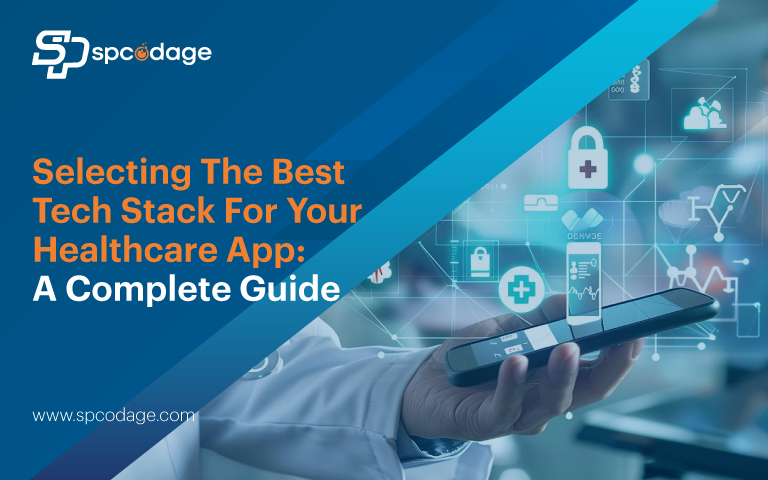In 2024, the healthcare sector has advanced significantly from the past, when access to healthcare was restricted to a select few. Many things are happening in the healthcare sector, from trends in healthcare app development to online medication delivery. When selecting the appropriate tech stack for creating a healthcare app, many developers of healthcare apps still lack a solid understanding of the fundamentals. This quick blog will discuss the healthcare sector, technology, trends, and more. Let’s get right in and begin our path towards health technology.
Why is it Important to Develop Apps for Healthcare?
Developing and creating mobile applications for the healthcare industry is known as “healthcare app development.” The scope of these applications is broad; they cover everything from digital doctor consultations and medical operations optimization to the fundamentals of patient engagement and chronic disease management. Enhanced patient care and experience, streamlined workflows in the healthcare industry, and improved health outcomes are its ideal uses.
2024 will see an abundance of strategic benefits from a strong healthcare app, including:
Increased Patient Engagement
Healthcare apps help improve overall diagnosis and adherence to care regimens by allowing patients to monitor and actively engage with their care.
Improved Convenience
Apps for healthcare technology eliminate any geographical restrictions, giving patients easier access to healthcare services and information at any time, anywhere.
Increased Efficiency in Operations
With well-designed solutions, healthcare mobile app development can eliminate laborious, boring, and repetitive administrative work. Healthcare apps increase efficiency and reduce additional costs by simplifying appointment scheduling and facilitating communication between patients and providers.
What is Tech Stack?
A tech stack is an arrangement of technologies used in tandem to create a web application. It is sometimes called a solutions stack, net stack, or technological infrastructure. Choosing a tech stack is essential for creating a healthcare app that is easy to update and maintains scalability.
Tech stacks help you determine the kind of application you must create and the resources needed to expand its functionality. The most widely utilized stacks combine Python (programming language), MongoDB (curating database), JavaScript (user interface), and Apache (thrift databases and HTTP server). However, because users access web servers through different devices and enormous volumes of data need to be processed, modern tech stacks consist of many more components.
The MEAN (MongoDB-Express-Angular-Node.js) stack has proven useful for web app development tech stack examples. Given React’s enormous popularity in single-page apps and other web app development categories, many healthcare app developers also utilize it instead of Angular to access the MERN stack.
Tips to Choose the Right Tech Stack for Your Healthcare App
The kind of app you’re developing will determine the tech stack you should choose. Here are some important things to consider before creating a healthcare app.
- The application’s goal
- Interface and design that are easy to use
- Total cost of resources and development
- App optimization and scalability
- Patient data security and protection
Tech Stack Types for Developing Healthcare Apps
Let’s now talk about the technologies that healthcare developers use to stay current with advancements in healthcare app development:
1. iOS App Development
Swift is the key language that employers look for in candidates seeking to develop iOS apps. Introduced by Apple in 2014, Swift enables programmers to create fantastic applications with strong code. Because of its simple syntax, Swift is simple to use, learn, read, and write. Security is a major concern when developing healthcare apps, but Swift’s statically typed language lessens this concern.
2. Android App Development
Although Kotlin was created as a Java analog, it hasn’t been as popular thereafter. The primary distinction in this case is that Kotlin is compatible with Android Studio. Java is a straightforward technology that provides transparent syntax and semantics to assist developers. It also provides perfect security, and its well-maintained procedures make it difficult to circumvent or hack.
Creating a strong code-reliant portal that puts medical data first is essential for healthcare mobile app development.
3. Cross-Platform Apps Development
Cross-platform application development provides developers with many programming languages to explore and test. Xamarin, React Native, and Flutter are the most widely utilized. You must conduct a study on the type of healthcare app you intend to design before selecting one of them. Let’s examine each of them separately:
- React Native: Besides being incredibly flexible, React Native enables developers to create apps that run on several platforms with the same code. It is simple to update JavaScript code modifications without releasing a new download update on the Play or App Store.
- Flutter: Google created this open-source framework, developed entirely in Dart. It is quick and effective because of its clear and adaptable interface. Flutter’s architecture produces thorough rendering and design, together with total customization.
- Xamarin: If you want to build for other platforms, the community strives to expand Xamarin to support GTK, WPF, and MacOS. Xamarin currently supports Windows, Android, iOS, UWP, and Tizen. This open-source technology curates Windows, Android, and iOS apps using .Net.
4. Third-Party App Integrations
It should be easy for your technology to interface with outside systems to increase patient and caregiver scalability, flexibility, and performance. The following integration technologies should be taken into account when developing a tech stack for healthcare apps:
- Integration of Google Maps
- APIs for video calls
- Secure payment APIs
- EMR/EHR interface for immediate access to medical data
- Integration of patient portal
- Management of scheduling
- Management of the revenue cycle
- APIs for insurance reimbursement
Conclusion
Selecting a healthcare app development business with prior mobile app development experience is important. Developing a healthcare app can be challenging and complex, requiring expertise in healthcare technology and the engagement of specialized app developers from companies like SPCodage.



